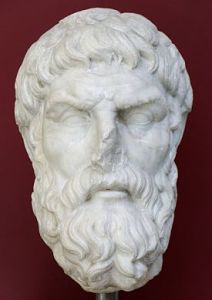Finding Happiness – The Epicurean Way
Let no one delay the study of philosophy while young nor weary of it when old.
– Epicurus
You may not know a lot about Epicurus (ancient Greek philosopher from 341-270 BCE), but you have likely heard of an epicurean.
An epicurean is someone who indulges in worldly pleasures. This includes sensual pleasure, as well as luxurious eating and drinking habits.
The only problem with all of this is that it is all wrong. Well, maybe not all wrong, but there is some confusion that should be cleared up.

Many people associate Epicurus with the idea of eating and drinking for all of pleasures sake. This is not what Epicurus endorsed.
While it is true that the philosophy of Epicurus is a hedonistic philosophy, (the idea that pleasure is the highest good and is what will bring us happiness) his idea of pleasure is much different from what some might imagine.
To clarify, Epicureans (capital ‘E’) are individuals who follow the philosophy of Epicurus, while epicureans (lower case ‘e’) pursue a life filled solely with luxury and pleasure; they are very different.
What is Hedonism?
Hedonism is generally seen as the philosophical idea that everyone should seek pleasure to the extreme. That is, enjoy whatever sensual relationships you want, eat all of the food you want and drink to your contentment. This is happiness for the hedonist.
While Epicurus also believed that pleasure was the greatest good, he believed that it should be attained by living modestly and learning about the world around us – not the ‘eat, drink, and have all the sex you like’ philosophy.
Epicurus recommended a virtuous and somewhat ascetic (self-disciplined) life as the best means to finding happiness and pleasure. This is very different from the Cyrenaics (4th century BCE, Greece) who were extreme hedonists.
Let’s look into his philosophy a bit more
Epicurus was one of the most famous philosophers of his day. He wrote many books and had many followers. One could say that his philosophy was focused on one thing: How to be happy. He even started a School for Happiness.
Like Aristotle, Epicurus believed that happiness is the highest good and the end to all other actions. That is, we seek happiness for its own sake and not for the sake of anything else (it is our end goal in life).
Where the two split is in how they believe we attain happiness. Epicurus believed that happiness was attaining pleasure (and avoiding pain). Aristotle, on the other hand, believed that we attain happiness by cultivating virtue.
Some typical ways in which people try to find happiness
Many people think they will find happiness in a romantic relationship. Once they find the love of their life and get married then they will be happy.
However, Epicurus points out that oftentimes romantic love leads to feelings of jealousy, anger, and other complications (not happy times).
Some people believe that money and material possessions will bring happiness. Epicurus, however, believed that in order to have a lot of money we need to work very hard. This is not something that will make us happy.
He believed that what we really want from work is to do something meaningful and helpful in some way. Working for lots of money will leave us unfulfilled. We want to work to bring value to the world.
So what would make us happy according to Epicurus?
He believed there were 3 key components of a happy life:
- Friendship
- Freedom and Self-Sufficiency
- Philosophical Thought
In order to better understand his philosophy, it is best to look at the school he created. The school was called ‘The Garden’ (it was actually set in a garden) and it can be thought of as the very first commune.
Epicurus purchased a large plot of land and built a house with several rooms and common areas. He and all of his friends would live there.
1. Friendship
One of the keys to happiness for Epicurus was having friends, but seeing our friends only on occasion will not make us happy. He thought that we should see our friends every day and spend time with them every day.
The house in ‘The Garden’ had individual rooms for privacy, but there were common areas throughout the property where everyone would spend time together.
Friends and like minded individuals bring us so much happiness and we need to spend more time with them. Friendship is very different from romantic relationships. Friendships are supportive, positive and fun, while romance can lead to negative feelings.
2. Freedom and Self Sufficiency
Freedom and self-sufficiency are other components of happiness. We want to be free to do the things we like and also be able to live sufficiently among friends. What does this mean though?

Looking at the community that Epicurus developed, everyone worked to sustain the community. There were farmers, tailors, wood workers, etc. The work they did was meaningful and needed by others. They, therefore, felt good about the work they did.
It is true they may not have had a lot of money, but all of their needs were met and they had time and freedom to do the things they enjoyed with their friends. That is, they had freedom and self-sufficiency.
Living in this community today
It would be quite different from the life we are used to. We would have to do something about all of the things (material possessions) we are used to having.
The question is, are all of these things making us happy? We seem to have a hard time understanding how to be happy. Maybe some of this advice could be helpful?
Desire
Epicurus realized there was a problem with desire. We want things in life because we think that they will bring us happiness. The problem is they only bring us temporary happiness, but nothing long-lasting.
What are we to do? He believed that our focus needs to be on moderating and limiting our desires.
There are 2 ways to deal with desire:
1) Strive until we fulfill the desire, or
2) Curb or eliminate the desire
The second method is the recommended way to deal with desire. If we lower our desires then it is easier to attain what we desire and therefore, we will be happier. When we strive and strive to attain our desire we often find that we are not happy and end up only desiring more.
Read about what the Buddha said about desire in the Four Noble Truths here.
Types of Desires
According to Epicurus, there are 3 types of desires:
1. Natural and Necessary
2. Natural but not Necessary
3. Vain and Empty
Natural and necessary desires must be met. They are things like food, shelter, and the like. It is natural to want these things and it is necessary for our survival.
Natural but not necessary desires are desires for a particular sort of thing – luxury food, for example. We certainly need food, but we don’t need a gourmet meal. If this is what you desire, but it’s not available, then you will be disappointed and unhappy.
The point is to enjoy something while it is available, but recognize that it is not necessary and should never be counted on. If we focus on meeting our basic needs of simply eating the food that is available, we will always be rich. That is, we become rich by desiring less.
Vain and empty desires are desires for power, wealth, fame, etc. Epicurus said that these sorts of desires are difficult to satisfy because they have no limit. Meaning, if you desire wealth and you attain it, you can always desire more. Once one sees that they can get more, they will want more.
These are not natural desires, but they are a part of our society. Epicurus believes that we have been fooled into thinking that they will bring us happiness. How can something that has no limit make us happy? These desires should be eliminated.
Can you see the difference in these types of desires? If you are hungry and desire food, that’s natural, but once you satisfy your limited hunger you will be happy. The other desires can never be satisfied and you will therefore never be happy.
If we learn to desire less, we will always meet our desires and be happy and tranquil.
One thing to note is that not all pleasures are good and all pains evil. We need to think about our life in the long term and calculate what is in our best interest.
That is, what will bring us long term happiness and not merely short term, immediate happiness? Here is where Epicurus clearly parts ways with the traditional hedonist who will eat, drink, and be merry for all the days.
We can’t eat whatever we want because it is not good for our body in the long run. We shouldn’t drink a bottle of wine every day for fear of becoming a drunk.
3. Philosophical Thought

The final component of the happy life is engaging in philosophical or rational thought. That is, living an analyzed life.
Epicurus believed that it was important to think about our life and examine our thoughts and feelings. Even though we try to limit our desires and do the things that make us happy, we may still occasionally feel anxiety and fear.
If we want to be happy, we need to explore these things and understand them.
This is something that everyone could benefit from – examining and contemplating life and exploring our thoughts and feelings. Nothing but good can come from this.
Epicurus knew that many people feared death – a fear of the unknown. But he said if we engage in philosophical thought and really look at death there is nothing to be afraid of. He says,
Death does not concern us because as long as we exist, death is not here. And when it does come, we no longer exist.
Try this: Think of what your life was like before you were born. You can’t because there is no life before you were born. Just as there is nothing when you die. There is nothing to fear because death is what happens when you are dead and it has nothing to do with life.
Summary
Here is what an Epicurean community would look like:
- A bunch of friends living in a big place together.
- They all do work to support the community and feel good that they are working for a cause.
- They have lots of freedom and time to do what they want.
- They realize that material things will not bring them lasting happiness, so they don’t desire them.
- They talk about life in order to understand themselves, their fears, feelings, and emotions so they can master these things and maintain their happiness.
Strange community? They were very popular throughout the Mediterranean and you can still find Epicureans today.
One thing that does seem obvious is that we are not very good at making ourselves happy.
Might there be something to this philosophy? How can we apply this to our life today? Most of us will probably not want to live in a commune type situation, but what about the core concepts?
- Spend more time with like-minded people (friends)
- Do work that makes us feel as though we bring value to the world
- Realize that material possessions do not bring long-term happiness
- Live a simple life, with few possessions
Minimalism?
Here is a question – Is the newer movement of minimalism a sort of Epicureanism? Minimalists generally don’t live with a bunch of other people, but what about the other concepts behind minimalism?
People are moving into small spaces, getting rid of there material possessions, living off the land by growing their own food.
They are in search of happiness, simplicity, and tranquility. And many will say they are happier than they have ever been. Maybe they are on the right track – just as Epicurus was!

It was a great and brief explanation of Epicurus’ philosophy. Thank you for that!
One question though, this article mentioned existing Epicurean communities, but I could not find any. Could you provide a link maybe with some sort of a list of these communities (possibly Europe).
Thanks again!
Hi Erno,
Thanks for your comment – you have a great question. As a philosophy and way of life, Epicureanism has certainly not seen the contemporary popularity that the philosophy of Stoicism has. There are all sorts of new books, blogs, podcasts, etc. discussing Stoicism as a modern-day way of life. But you really don’t see the same with Epicureanism. There are reports of communities in Greece that ascribe to the philosophy, but if you think about their belief system (self-sufficiency, freedom, living among like minds – away from society), it is easy to see how they are hard to find. They are not as ‘connected’ (via the Internet) as most of us are. There are, however, some resources online that you may be interested in. The Society of Friends of Epicurus would be a good place to start. They have several resources to explore; they also have a Twitter feed you can follow. I hope you find something that interests you. Thank you for reading!
Thank you for your good Article. I liked its contents. you have mentioned the real teachings of epicurus and the heart touching quotes. Thank you…….
Thank you for reading and commenting!
Thank you, L.A. Brandenburg, for this truly beautiful article. Epicurus has been my favorite philosopher for a very long time (I’m 56 years old). And while I don’t live in an Epicurean commune (there are none in my area), I do my best to live an Epicurean lifestyle nonetheless. I can’t speak for others, but the lifestyle definitely works for me.
Most might be hard-pressed to break away from the habits of consumerism in our greed-driven, money-hungry materialistic society, but living by a “less is more” mentality does go a long way to cultivating happiness.
You’re doing a great job helping people get intellectually fit. Thank you for making the world a better place.
Thank you for your kind words, Andrew.